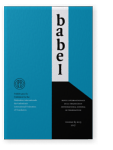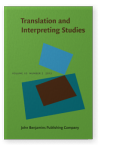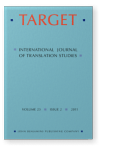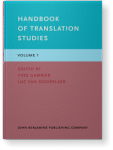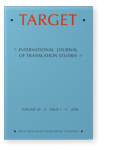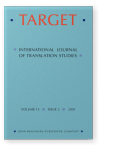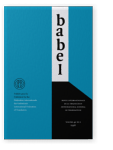Nam Fung Chang
List of John Benjamins publications for which Nam Fung Chang plays a role.
2017 Self-image and self-reflection: From China’s outbound translation strategies to her cultural export policy Babel 63:5, pp. 643–666 | Article
The futility of decades of government efforts to disseminate Chinese literature has triggered discussions among Chinese scholars on how to translate and who should be entrusted with this task. Some blame the failure on traditional concepts of translation that overemphasize faithfulness to the… read more
2015 Does ‘translation’ reflect a narrower concept than ‘fanyi’? On the impact of Western theories on China and the concern about Eurocentrism Translation and Interpreting Studies 10:2, pp. 223–242 | Article
Taking China as a case in point, this paper addresses the concern among some Western scholars that the concept of translation in the European tradition is narrower than in some other cultures so that the spread of Western concepts and theories to the rest of the world is threatening “biodiversity”.… read more
2011 In defence of polysystem theory Target 23:2, pp. 311–347 | Discussion
This article revisits Itamar Even-Zohar’s polysystem theory, including its hypotheses on the position of translated literature and its relation with translation norms, and some of its basic assumptions and principles, such as the heterogeneity, dynamics and overlapping of systems, the quest for… read more
2010 Polysystem theory and translation Handbook of Translation Studies: Volume 1, Gambier, Yves and Luc van Doorslaer (eds.), pp. 257–263 | Article
2008 A missing link in Itamar Even-Zohar’s theoretical thinking Target 20:1, pp. 135–149 | Article
According to Itamar Even-Zohar, for a large social entity to be maintained, a culture repertoire must be invented to create internal cohesion and external differentiation, and from this repertoire certain items are chosen to build a collective identity. In contrast, imported items, if regarded as… read more
2001 Polysystem theory: Its prospect as a framework for translation research Target 13:2, pp. 317–332 | Article
This article deals with three interrelated issues: first the ‘cultural turn’ of Itamar Even-Zohar in contrast to the ‘cultural turn’ in Translation Studies, then the application of an augmented version of Polysystem theory in a short case study, and finally the question of objectivity and… read more
1996 Towards a Better General Theory of Equivalent Effect Babel 42:1, pp. 1–17 | Article
ABSTRACT On the premise that translating is communicating, E.A. Nida puts forward a theory of dynamic equivalence based on the principle of equivalent effect, which lays a great emphasis on the response of the receptor, but there are some fuzzy areas in his theory, such as whether cultural… read more
